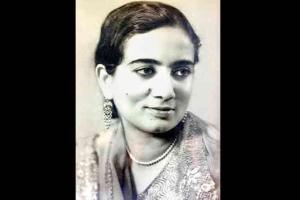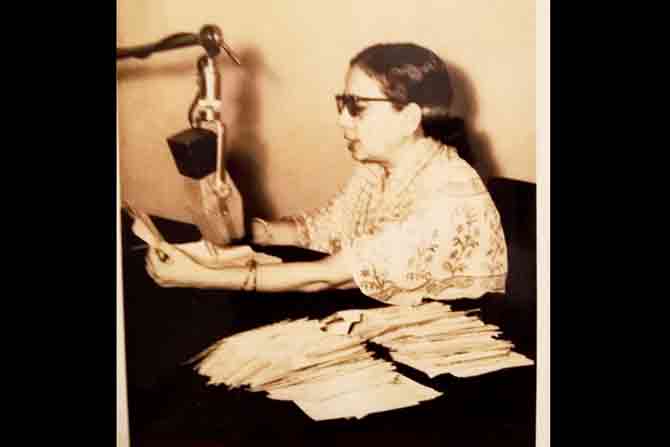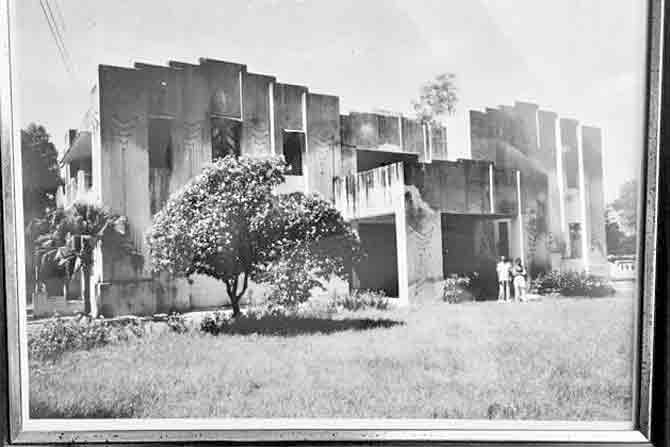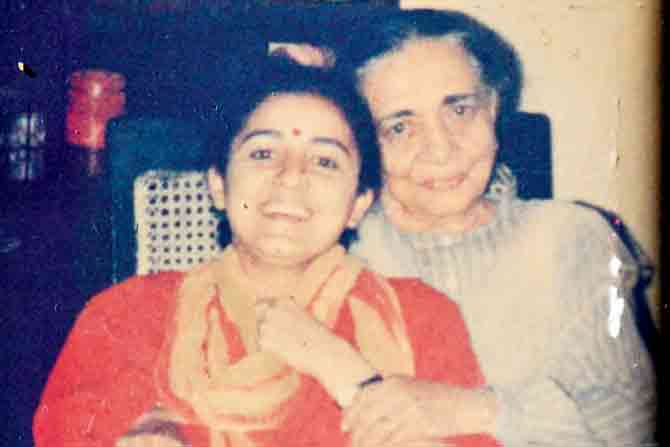Whats the story behind Indias first female voice on All India Radio? An Urdu memoir, translated by Saeeda Banos granddaughter, revisits a phenomenal, yet forgotten legacy

Saeeda Bano (Bibi). Pics courtesy/Off the beaten track, Penguin
Some stories are meant to be told, even if it takes forever. Like Saeeda Bano's. Bano (1913-2001) was the first Indian woman to work as radio newsreader at the All India Radio. She is the heroine we all needed, but whose legacy somehow got lost. Fortunately, she left behind her memoir, Dager Say Hat Kar that won the Delhi Urdu Academy Award in 1994, and a series of audio cassettes, which spurred her granddaughter Shahana Raza to revisit this glorious life in the just released title, Off The Beaten Track: The Story of My Unconventional Life (Penguin Random House).
ADVERTISEMENT
A translation of the original was Bano's dream, before it became Raza's. Sometime after it was published, Bano suffered a paralytic stroke, which left her bed-bound. When Raza paid her a visit, she asked if she'd translate the memoir for her. "But Bibi you have written it in Urdu, you know I can't read Urdu," Raza remembers telling her. "This was in the summer of 1997. Shortly afterwards, just as I was leaving for America [from Delhi] to make a life for myself, eight neatly marked audio cassettes were handed to me. Bibi got her friend Nazneen (Baby Baji) to read and record the entire book for me onto analog audiotapes. The tapes travelled with me first to New York, then Tampa and finally to Dubai where I settled in the year 2000 and started a family. Unfortunately, I was so absorbed with the rhythm of my own life I couldn't translate Dagar in Bibi's lifetime," UAE-based Raza shares in the book.

Bano joined AIR in August 1947
It was only three-and-a-half years ago that Raza went back to those tapes. And, even though her grandmother was an open-book, Raza admits her story was quite a revelation to her. "She was always ahead of her times," says Raza, in a telephonic interview. "We used to have these very frank discussions about divorce, and choice. I was equally feisty, so, I'd challenge what she said, and that would often lead to small differences." In hindsight, she feels the kind of discussions they had, rarely defined most grandmother-granddaughter relationships. The book, which began as a personal project, helped her understand how her Bibi became a force to reckon with.
The seeds of Bano's feminist values were sown in her childhood. While her family hailed from Lucknow, she spent her early years in the princely state of Bhopal, where her father, Mir Majid Husain, taught English to the then ruler, Nawab Sultan Jahan Begum's sons. The state had been ruled by women for nearly four generations. This not only had an impact on Bano, but also her mother, Asharfunisa, whom Sultan Jahan Begum had particularly taken a shine to, offering her a Bhopali joda from her own wardrobe, so that she didn't have to wear those "restrictive clothes". Later admitted to Isabella Thoburn College in Lucknow, she learnt to breathe more freely. When the family received a marriage proposal from the Raza family, asking Bano's hand for Abbas Raza who was a munsif (judge) in the Judicial Service, she had protested the match, shooting off a letter to her father expressing the desire to study. "I wrote that I was also keen to learn how to play the piano and mentioned briefly that I was absolutely not ready for marriage. I did not even receive a one-line reply in response to my four-page rant," Bano writes in the book. The marriage was inevitable, but by her own admission, there was no love. Having a capricious husband, didn't help. Meanwhile, she kept herself busy, raising her sons Asad and Saeed, and also became a regular on a show of a newly-launched radio station in Lucknow, after being invited to participate in a discussion. During one of the low phases of their relationship, she had sent an application to BBC London for a job, with a recording of her voice on a disc, only to have Abbas throw cold water on her plans. The struggle ended, when Abbas walked out of their home, Kashana-e-Raza. Instead of staying back with her in-laws, she enlisted the help of Vijayalaxmi Pandit (Jawaharlal Nehru's sister), who was known to the family, to get a job at AIR Delhi. "The fact that she could leave Lucknow, uproot herself from that secure and comfortable life in Kashana-e-Raza, and stay in a women's hostel in Delhi [YMCA], a place she knew nothing about, was most exceptional," feels Raza, adding "I don't think I would dare to do that even today." Bano arrived in Delhi with her younger son Saeed, in early August 1947, when the country was at the cusp of making history. But the celebrations were soon marred by the Partition, which momentarily altered her life, as well. Her close friendship with Nuruddin Ahmed, a barrister and renowned criminal lawyer of the Supreme Court, who later went on to become the Mayor of Delhi, was perhaps her life's most complex chapter. Ahmed was a married man; Bano had tried hard to end the friendship, only to realise she had been in love all along. "I had compromised with all the complexities of our relationship. But each day brought with it unrelenting hardships. I was reminded of the story The Legend of Farhad and Shirin in which the fictitious character Farhad has to overcome the arduous task of carving out a canal through impenetrable mountains and then divert a tiny rivulet of water through it, just to win the love of Shirin," Bano writes.

Kashana-e-Raza, Lucknow, designed by American architect Walter Burley Griffin, where Bano lived with her husband and children until she lived to Delhi
But, what makes this memoir an important one, is also her professional strides at AIR. When AIR launched its Urdu service, she began taking on more programming work, leading a Women and Children's show, analysing news, broadcasting short bulletins, and also producing a five-minute show called Dekhi-Suni. In her memoir, she writes about this very matter-of-factly.

Shahana Raza with her grandmother Saeeda Bano, 1996, New Delhi
"My grandmother never tom-tommed about anything she did. Whatever she did, was not meant to be flashed in anyone's face. I never knew she had had breakfast with [Jawaharlal] Nehru, until I heard the tapes," says Raza. Her most memorable story related to her Bibi is one that never made it to the book, because Bano chose not to write about it in the memoir. "I don't know when this incident took place, but she used to visit this club, where the Englishwomen would be swimming in the pool. One day, she jumped into the shallow side in her kurta-pyjama. She knew that until she didn't get into the pool, she'd not know how to swim. She wanted to have that experience. That was her. She was gutsy."
Keep scrolling to read more news
Catch up on all the latest Mumbai news, crime news, current affairs, and a complete guide from food to things to do and events across Mumbai. Also download the new mid-day Android and iOS apps to get latest updates.
Mid-Day is now on Telegram. Click here to join our channel (@middayinfomedialtd) and stay updated with the latest news
 Subscribe today by clicking the link and stay updated with the latest news!" Click here!
Subscribe today by clicking the link and stay updated with the latest news!" Click here!






